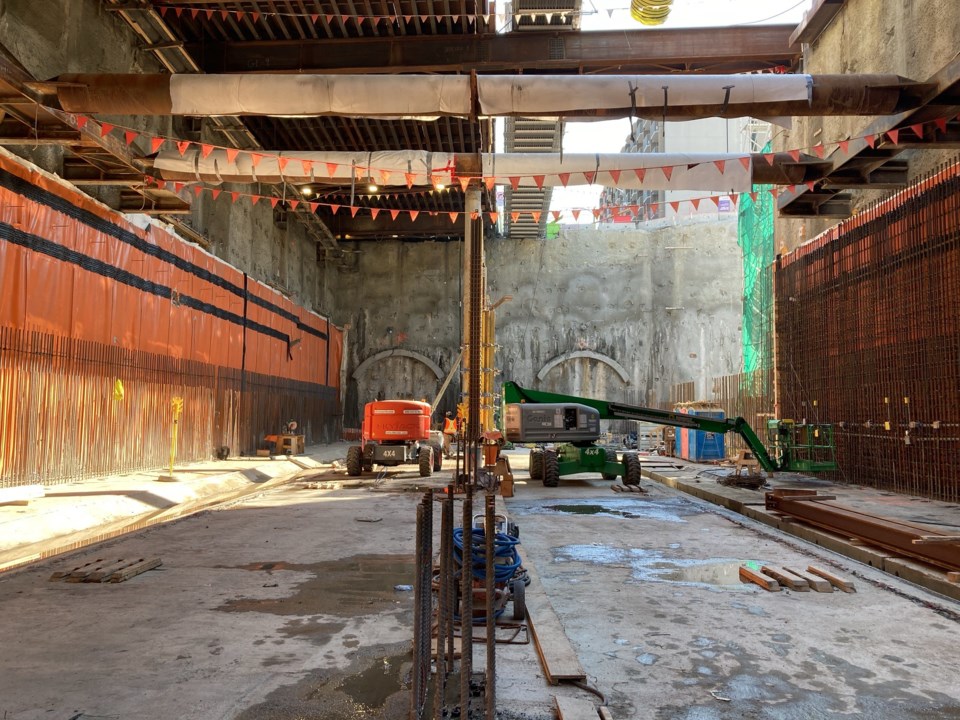The provincial government is refusing to say when it expects Broadway Subway in Vancouver to be in service.
Last November, after a summertime concrete supply strike, the Ministry of Transportation and Infrastructure moved the completion target from late 2025 to early 2026. This past February’s project status update showed the revised date for service commencement was Feb. 7, 2026. But that date was omitted from the April version of the report.
After the boring machine for the inbound tunnel, named Phyllis, reached the future Oak-VGH Station on Oct. 12, the Ministry said the budget remains at $2.83 billion. But the ministry refused to disclose a construction schedule update.
“Once boring is complete, we will have more clarity on the timing of the remaining construction activities and overall project schedule,” according a statement provided by ministry spokesman Murray Sinclair.
The outbound tunnel boring machine (TBM), named Elsie, reached Oak-VGH Station this past Saturday morning, according to the Ministry’s announcement the following day. The ministry said the TBMs have each dug two kilometres.
However, based on an Oct. 7, 2022, announcement, the TBMs should have been approaching their destination at Cypress Street near the future Arbutus Station by now.
At the time, the Ministry said “each TBM is expected to take about a year to carve out the subway's inbound and outbound tunnels.”
Phyllis and Elsie were launched separately from the Great Northern Way-Emily Carr station on the six-station, 5.7-kilometre Millennium Line extension.
After Oak-VGH, the next station is South Granville, which is more than a kilometre west. Cypress Street is a further 700 metres.
In April, a reporter asked under the freedom of information law for a copy of the latest project status report for the Broadway Subway. The confidential internal report, co-authored by project director Javier Sanz of contractor Acciona, was not disclosed until October.
It said that as of the end of February, Elsie had travelled 735 metres, or almost 21 per cent of its route, with 2.8 kilometres remaining.
Phyllis had completed almost 554 metres, more than 15 per cent of its route, with three kilometres remaining.
The October 2022-launched Elsie is named for the world’s first woman aeronautical engineer, Elsie MacGill. Phyllis, named for mountaineering pioneer Phyllis Munday, followed in late November.
The report censored sections in their entirety about the critical path schedule and the reasons for deviations from the original schedule. Similarly, both the cost performance and cashflow were censored from an executive summary report.
The documents said there had been a total of 248 first aid and 44 medical aid incidents since the project began. There had also been 67 reports of near-misses and 53 incidents of equipment, vehicle and property damage.
Incidents averaged one per day in February. There were five sprain/strain injuries, four for debris in eyes, and one each for a sliver, concrete burn and strike in the eye. A worker slipped on waterproofing membrane at the Broadway-City Hall station and sustained a hairline arm fracture.
There were six cases of property damage, including a fence that fell on a car at Great Northern Way, a large piece of sandstone that came loose and struck and damaged an excavator window at Oak-VGH and shotcrete that struck an apartment building at Arbutus.
WorkSafe小蓝视频 issued an order for failing to conduct silica monitoring at the start of tunnel-boring activities. The WorkSafe小蓝视频 website calls silica “one of the most common hazards on a worksite.” Exposure to silica dust can cause workers to develop lung cancer.
WorkSafe小蓝视频 also found that terms and conditions were not followed for ventilation, diesel equipment and hours of work. A ventilation survey was not performed nor was an air-monitoring plan developed.
The biggest environmental incident report in February noted that “approximately 28,000 gallons of turbid water was released to a catch basin.”




